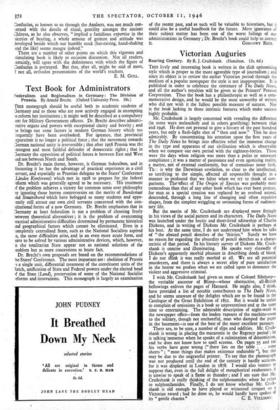Text Book for Administrators
Federalism and Regionalism in Germany : The Division of Prussia. By Arnold Brecht. (Oxford University Press. 18s.)
This monograph should be useful both to academic students of 3ermany and to those who are now actively engaged in attempting io reform her institutions ; it might well be described as a compulsory ext for Military Government officers. Dr. Brecht describes adminis- -rative organs and powers with exceptional clarity and brevity ; and le brings out some factors in modern German history which too requently have been overlooked. For instance, that provincial .eparatism is no longer a political force that the movement towards Crerman national unity is irreversible ; that after 1918 Prussia was the ,trongest and most faithful defender of democratic rights ; that in 3ermany the opposition of political forces is between East and West Ind not between North and South.
Dr. Brecht's main theme, however, is German federalism, and in iiscussing it he has the advantage of practical experience as a civil ,ervant, and especially as Prussian delegate to the States' Conference Landes Kanferenz) which met in 1928 to prepare for the federal -dorm which was generally agreed to be necessary. His treatment if the problem achieves a victory for common sense over philosophy ay ignoring those barren controversies on the merits of Bundestaat Ind Staaresbund which have befogged so many students and appa- .ently still attract our own civil servants concerned with the con- ;titutional forms of a new Germany. Dr. Brecht emphasises that in Crermany at least federalism is not a problem of choosing freely aetween theoretical alternatives ; it is the problem of overcoming ractical administrative difficulties determined by permanent historical ind geographical factors which cannot be eliminated. Even in a :ompletely centralised State, such as the National Socialists aspired o, the same difficulties arise, and in an even more acute form, and save to be solved by various administrative devices, which, however, n the totalitarian State appear not as national solutions of the )roblem but as mere concessions to brute fact.
Dr. Brecht's own proposals are based on the recommendations of he States' Conference. The most important are : abolition of Prussia 's a single unit, differential treatment of the constituent units of the leich, unification of State and Federal powers under the elected head )f the State (Land), preservation of some of the National Socialist -eforms and innovations. This monograph is largely an examination
of the recent past, and as such will be valuable to historians, but it could also be a useful handbook for the future. Mere ignorance of their subject matter has been one of the worst failings of our administrations in Germany ; Dr. Brecht's book could help to correct






























 Previous page
Previous page